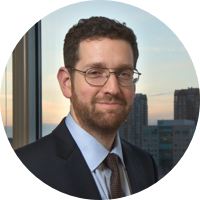Interview with Marom Bikson, PhD
What are most innovative or important ideas you want to share at your talk at the conference?
I am chairing the conference session on New Engineering of Neuromodulation & Brain Machine Interfaces and giving the overview lecture that each session opens with. There has been a remarkable acceleration, in the past few years, the deployment of new neuromodulation and neural interfacing technologies. This is not to say there has not been foundational neural engineering research for decades, but that a convergence of factors – including developments in machine learning, wearables, market forces, and advances in brain science – are accelerating the translation of inventions to products. The speakers in this session Sarah Laszlo of GoogleX, Cristin Welle from University of Colorado, Cynthia Chestek from University of Michigan, Maryam Shanechi of USC, are creating incredibly impactful and innovative neural interface technologies.
What are you most excited about (or looking forward to) at NTS/NYN Napa?
The joint meeting of Neuromodulation: The Science and NYC Neuromodulation is exciting for exactly that reason: this is the first convergence of the two largest and most dynamic meetings focused on the science underling brain technology. From the first to last minute, it is an incredibly curated program divided in 8 thematic sessions that intended to both show-case the absolute most exiting researchers and research directions, while also acting as a primer to individuals outside those specific specialties on what’s worth paying attention to. As the founding chairman of NYC Neuromodulation, I’ve been asked about running a meeting together with Neuromodulation: The Science and for the first time outside of New York City. My response is that's was an easy decision and process. Neuromodulation: The Science has the identical ethos as NYC Neuromodulation, which is that meaningful breakthrough in neuromodulation and brain technologies must be built on sound science. As far as leaving NYC… well it is Napa in October!
Either based on your own research, or on broader emerging brain interfacing technologies, where do you see the most potential for new technology to impact society and healthcare in the next 5 years?
For those us working in neuromodulation for decades, the impact and potential of brain stimulation in the treatment of disease was always evident. But, in the past, the rate of progress was frustrating both as far as the release of new products and expanding indications. Well, anyone paying attention to the train of breakthroughs in neural interfacing and the steep acceleration in new technology release, appreciates this feels like a renaissance. From wearables on your wrist for movement disorders, to headbands that control epilepsy, to implants that monitor brain state to delivery personalized therapy, this is simply a thrilling time for brain technologies. So, looking ahead to the next five years, I feel we can just look around us now at new science and technology being deployed today. The joint meeting of Neuromodulation: The Science and NYC Neuromodulation is almost like a “watch this space” for existing technologies that will transform the treatment of neurological and psychiatric disorders, neuro-rehabilitation, and revive cognition. I don't know what could be more important or impactful.
